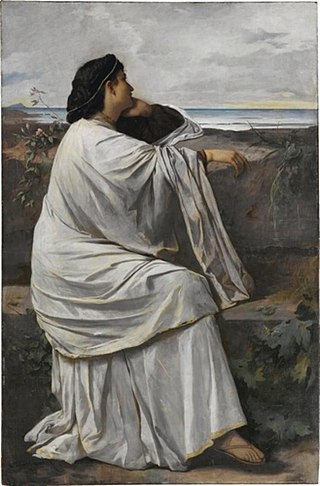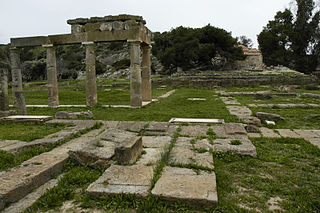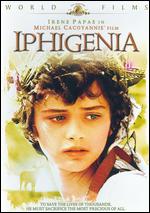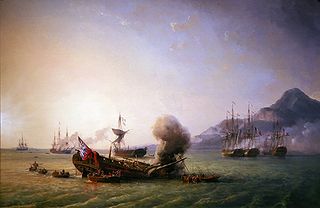
In Greek mythology, Agamemnon was a king of Mycenae who commanded the Acheans during the Trojan War. He was the son of King Atreus and Queen Aerope, the brother of Menelaus, the husband of Clytemnestra, and the father of Iphigenia, Iphianassa, Electra, Laodike, Orestes and Chrysothemis. Legends make him the king of Mycenae or Argos, thought to be different names for the same area. Agamemnon was killed upon his return from Troy by Clytemnestra, or in an older version of the story, by Clytemnestra's lover Aegisthus.

In Greek mythology, Iphigenia was a daughter of King Agamemnon and Queen Clytemnestra, and thus a princess of Mycenae.

The viola d'amore is a 7- or 6-stringed musical instrument with sympathetic strings used chiefly in the baroque period. It is played under the chin in the same manner as the violin.
Iphigénie en Tauride is a 1779 opera by Christoph Willibald Gluck in four acts. It was his fifth opera for the French stage. The libretto was written by Nicolas-François Guillard.

Carl Heinrich Graun was a German composer and tenor. Along with Johann Adolph Hasse, he is considered to be the most important German composer of Italian opera of his time.

Iphigenia is a fairly large and exceedingly dark main-belt asteroid. It is classified as a C-type asteroid, and therefore probably has a primitive carbonaceous composition. It was discovered by German-American astronomer C. H. F. Peters on September 19, 1870, and named after Iphigenia, a princess sacrificed by her father in Greek mythology. The orbital elements for 112 Iphigenia were published by German astronomer Friedrich Tietjen in 1871.
This is a list of notable events in music that took place in the year 1731.

Iphigenia in Aulis or Iphigenia at Aulis is the last of the extant works by the playwright Euripides. Written between 408, after Orestes, and 406 BC, the year of Euripides' death, the play was first produced the following year in a trilogy with The Bacchae and Alcmaeon in Corinth by his son or nephew, Euripides the Younger, and won first place at the City Dionysia in Athens.

Iphigenia in Tauris is a drama by the playwright Euripides, written between 414 BC and 412 BC. It has much in common with another of Euripides's plays, Helen, as well as the lost play Andromeda, and is often described as a romance, a melodrama, a tragi-comedy or an escape play.

Iphigenia in Tauris is a reworking by Johann Wolfgang von Goethe of the ancient Greek tragedy Ἰφιγένεια ἐν Ταύροις by Euripides. Euripides' title means "Iphigenia among the Taurians", whereas Goethe's title means "Iphigenia in Taurica", the country of the Tauri.

Brauron was one of the twelve cities of ancient Attica, but never mentioned as a deme, though it continued to exist down to the latest times. It was situated on or near the eastern coast of Attica, between Steiria and Halae Araphenides, near the river Erasinus. Brauron is celebrated on account of the worship of Artemis Brauronia, in whose honour a festival was celebrated in this place. This site includes the remains of a temple, a stoa, and a theatre, providing insights into the religious practices and social life of ancient Greece. Its significance as a religious and cultural site can be further understood through the exploration of its archeological remains and historical accounts.

Iphigenia is a 1977 Greek film directed by Michael Cacoyannis, based on the Greek myth of Iphigenia, the daughter of Agamemnon and Clytemnestra, who was ordered by the goddess Artemis to be sacrificed. Cacoyannis adapted the film, the third in his "Greek Tragedy" trilogy, from his stage production of Euripides' play Iphigenia at Aulis. The film stars Tatiana Papamoschou as Iphigenia, Kostas Kazakos as Agamemnon and Irene Papas as Clytemnestra. The score was composed by Mikis Theodorakis.
Dimitris Dragatakis was a Greek composer of classical music and Greek art music.

The Battle of Grand Port was a naval battle fought on 20–27 August 1810 between squadrons of frigates from the French Navy and the British Royal Navy over possession of the harbour of Grand Port on Île de France, as part of the Mauritius campaign during the Napoleonic Wars. A British squadron of four frigates sought to blockade the port to prevent its use by the French through the capture of the fortified Île de la Passe at its entrance. This position was seized by a British landing party on 13 August and, when a French squadron under Captain Guy-Victor Duperré approached the bay nine days later, the British commander, Captain Samuel Pym, decided to lure them into coastal waters where his forces could ambush them.

P.D.Q. Bach in Houston: We Have a Problem! is a live performance celebrating 40 years of P. D. Q. Bach. This performance features Professor Peter Schickele with Orchestra X conducted by Peter Jacoby. It includes never-before-recorded performances of "Trumpet Involuntary" movement of Iphigenia in Brooklyn, and also the rounds Odden und Enden.

HMS Iphigenia was a Royal Navy 36-gun Perseverance-class fifth-rate frigate. She was built at Chatham Dockyard by Master Shipwright Robert Seppings.
Helen Margaret Gifford OAM is an Australian composer. On Australia Day 1996 she was appointed to the Medal of the Order of Australia, "in recognition of service to music as a composer". At the APRA Music Awards of 2016 she won the category "Distinguished Services to Australian Music".

Cymon and Iphigenia is an oil on canvas painting by Frederic Leighton, 1st Baron Leighton. The painting does not bear a date but was first exhibited at the Royal Academy of Arts, London, in 1884. The Art Gallery of New South Wales in Sydney, Australia, purchased it at a Christie's auction in London in 1976.
Bernardo Aliprandi was an Italian composer and cellist.
This article lists notable compositions within the viola repertoire. The list includes works in which the viola is a featured instrument. The list is ordered by composer surname.














